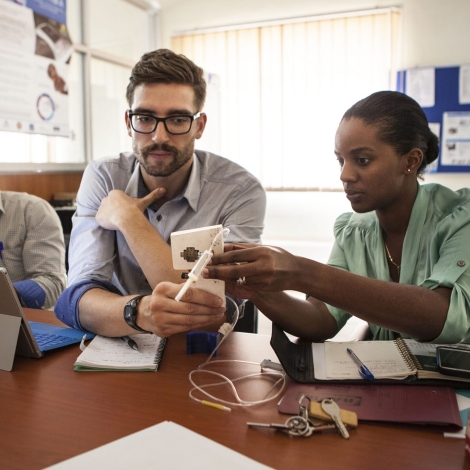African innovation in technology has to grow considerably and address long-term economic value if it is to compete in the global market. Just like Asia, there is a great need to create an all-inclusive innovation ecosystem focusing on production of local high-value solutions that can compete on the international market to promote exportation.
Africa’s future is dependent on minds, not on mines.
Africa’s future is dependent on minds, not on mines, according to a Deloitte report presented at the World Economic Forum on Africa in 2016. The report calls for investing in innovation as an absolute and fundamental shift in the continent’s traditional business model. With a 1.03 billion population, 60 percent of which is under the age of 35; this constitutes a valuable resource once equipped with the right skills and opportunities that could help propel Africa onto a higher growth path (African Development Bank Report 2014).
Development of competitive economies with consistent community inclusion and national growth with a majority of the domestic industries generating a higher return on investments is hinged on the capacity of the resident labor market to create innovative solutions that impact both the domestic and international market. In reality, it starts with creating an education that nurtures creative thinking and innovation for the future we intend to create. This expounds on the local skills and talent for creative solutions and exercises innovation muscles among citizenry.
The solid drive for local innovation in Africa has attracted several global firms and tech hubs. These tech hubs could be anything from incubators, co-working spaces, makerspaces, accelerators to mention but a few. Based on the 2016 research carried out by GSMA Ecosystem Accelerator, Africa realized up to 314 active tech hubs as compared to the 120 tech hubs listed in by the World Bank Report in September 2015. These tech hubs provide space and a platform for the locals to exercise their creativity and develop various solutions.
The solid drive for local innovation in Africa has attracted global firms and tech hubs.
This rise in the tech hubs has led to a significant improvement in African innovation and has seen the region performing exceptionally at the international scene. In terms of innovation achievements, Sub-Saharan Africa consistently presents new economies such as Burundi and Tanzania with Kenya, Rwanda, Senegal, Uganda, Mozambique, and Malawi standing out as innovation achievers at least five times in the previous six years (The 2017 Global Innovation Index report).
In Uganda, the government drive to have more job creators than job seekers has created a generation of new entrepreneurs well equipped to develop innovative solutions in areas of agribusiness technologies, climate resilient solutions, low cost energy & transport solutions, health and medical equipment and solutions etc. that unlock development, increase output and improve service delivery.
This has created a pool of talented and resourceful human capital producing award winning innovations. The following, for example, are selected from current and future entries in E4C’s Solutions Library: Matibabu, a low-cost method for testing malaria by Brian Gitta, won the 2018 The Africa Prize for Engineering Innovation; Kiira Motors Corporation won the 2016 Frost & Sullivan Uganda Visionary Innovation Leadership Award in Redefining Mobility; Philippa Ngaju’s Electronically Controlled Gravity Feed Infusion Set (ECGF) won the Innovation Prize for Africa; U-report Uganda won the prestigious global mobile UN World Summit Award (WSA mobile); and Mobile Money from MTN Uganda & many others have won local awards.
Notably, the top innovating countries have highly valued organizations coupled with effective regulatory authorities and business environment, especially in the private sector. Also, they have created effective innovation ecosystems with substantial funding available from both the private and public sector. In line with this, Uganda’s Ministry of Science, Technology and Innovation has allocated funds (up to UGX 11.5 billion) to coordinate, facilitate and oversee the process of technological assessment, transfer and adoption, all multi-sector research and innovation activities and development of innovation clusters and technology platforms across the country.
But for technological innovation to impact community, more measures have to be put in place. Those could include the following.
- Encourage technology diffusion and absorption. It is very critical to establish new innovative solutions and mechanisms for transfer of knowledge and skills particularly in scalable solutions that benefit the underprivileged. The networks and groups of the innovators developing low cost solutions that directly benefit immediate societies and communities need to be nurtured and supported through the different training and mentoring programs coupled with seed funding and support infrastructure for upscaling.
- Boost unrestricted flow of knowledge and talent. The flow of skilled individuals and knowledge is crucial in creation of mechanisms that enhance collaboration and experience exchange in developing regional and national innovation ecosystems. This focuses on creation of better learning atmosphere that inspires experimentation and rational reasoning which are the basis of innovation and successive development. This works as innovation antennas for the generations of the young inventors in the developing regions and provides the potential to recognize non-traditional actors in the economic, social and human development space to incorporate their expertise to the design and tackle a development challenge.
- Promote innovation productivity and connection to the innovation markets. An assessment of the local innovation ecosystems has to be done to identify the gaps in these systems and create targeted interventions to improve prioritization and output of innovators locally especially in the informal sector. It can be achieved through strengthening the technical manpower and developing indigenous capacity in utilizing innovations for development.
- Make use of intellectual property to encourage innovation in low-developed countries. IP rights provide a very good incentive for investment in technological innovation. This mainly provides room for retention of talent in the developing economies to create innovative and sustainable solutions that have an impact on the domestic market.
Therefore, to have a sustainable impact on community and economic development, there is need to enhance an atmosphere that encourages innovation, provides an environment in which it is safe to fail, and harnesses the power of partnerships, collaboration and research to size down the solutions or products to particular niche markets.
About the Author
Peter A. Kyeyune is an E4C Research Fellow working with Kiira Motors, a presidential initiative aimed at championing value addition in the domestic automotive industry for job creation and diversification of the Ugandan economy. He studied electrical engineering at Makerere University (Uganda) as an undergraduate and earned his Master’s in Technology Entrepreneurship at the University of Maryland (USA).

